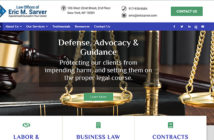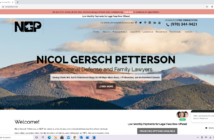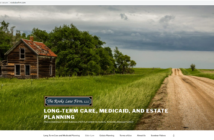Workshops for insurance agents, small business owners, and the public are the backbone of this successful firm’s client-generation efforts. Enhancements, failures, tips, and more.
Bonnie Simran Bhatia is an estate planning and small business lawyer, and a founding partner at Scribe Law. She is licensed to practice in the state of Illinois, but she is in the process of offering more virtual legal services. You can find her online at ScribeLaw.com.
She has tried a variety of marketing techniques, and explains below what has worked and what has not.

1. What’s the biggest marketing challenge you have when it comes to bringing in new clients?
Marketing to the right clients.
For example, we’ve been relaunching a young parent initiative—we don’t have a particular name for it just yet—that targets young adults with newborns or very young children who are minors and may need some basic estate planning to provide guardianship provisions. If something happened to them, they want someone to take care of their children.
Where do we go to find people who will be receptive to this message instead of just marketing it generally? We’re currently working on setting up workshops at prenatal centers.
We have a good structure set up for the workshops. We market them through our newsletter rather than our website because we don’t want every Tom, Dick and Harry showing up. We want qualified leads in our workshops.
A big challenge is getting the people in charge of these centers or networking groups to talk to us, because they’ve been approached by hundreds of other attorneys before. We want them to realize that we’re doing things really differently and that we’re not trying to be smarmy or just out there for the money. We genuinely want to connect their existing clients and provide them an additional service.

2. Tell me more about your workshops.
I do them in a couple different formats.
One I do is for insurance agencies. We target them because they’re a great referral source for us on the estate planning side. They’re already talking about the same things with their clients as we are and the workshops become an extension of that discussion. These workshops occur whenever they call us in, so probably one to two times a month I’m going into different agencies.
Of the workshops we do for the public, half are for small business owners because we do a lot of small business law and a ton of succession planning coaching. The other half of our public workshops are for the estate planning crowd. We hold them monthly to every six weeks.
Right now we do those workshops in person, in our office conference room. I’ve been focusing on how to translate them into an online webinar-workshop experience instead. We’re doing this because of the challenge that we’ve had reaching the younger crowd. They’re so busy, we want to make our workshops more accessible and flexible.
We do more workshops in February and March as we get closer to tax season, because that impacts both the small businesses we’re dealing with as well as the individuals who are doing estate planning.
We also do more estate planning workshops September to early November because parents’ kids are finally back in school and end of year due dates are approaching.
We do offer workshops in the summer but attendance is lower.
A few months ago we surveyed 80-90 different couples whose conflicts prevented workshop attendance. They requested an easier format. They said, ‘We do want to do this, we really like the idea of working with you, but we can’t do it because the only time we have available is 11:00 p.m. It would be great if you had something that I could just click on and play a video.’
So we’re creating something that’s similar to our in-person workshops in terms of the content delivery, but using videos, screenshots, and worksheets.
3. You also mentioned a newsletter. Tell me about it.
We have a newsletter that we have partitioned into three or four different groups. One’s for advisors, like the insurance agents that we’re dealing with or financial advisors; people who are a good referral source for us. To them we send out more frequent updates.

We have a content series which teaches these referral sources how to approach a client, or how to do estate planning or business succession planning. We call these our ‘conversation starters.’ This content is not yet a course, but we are trying to create one.
With the estate planning and the small business client lists we only send out reminders for workshops so that we can get them to enroll online. We don’t send out additional material.
4. Does your free consultation help you qualify people and make sure they’re a good fit for you? Has it been a good way to bring in new clients?
Yes, it’s actually a great way to bring in new clients. What we do is provide a sign-up sheet for the free initial consult after giving a workshop.
We do a lot of speaking at networking groups. People get to see me, understand my personality, hear how our process and practice work. However, they don’t get a chance during the Q&A to learn how I can solve their problem.
The best way to market is to learn someone’s pain points and then provide a solution. We require free consults to fill out an intake form ahead of time, before they come in. The intake forms are fairly extensive. We break them down into the data/financial or technical information about their business or their estate planning, and then address the emotional side.
Completing this form tells us the prospect is proactive and willing to do some homework to get something for free. They are invested and probably already like us, so only a nudge will be needed to close the sale. The initial consult provides that nudge.
In between when the prospect is filling out the intake form and when they come in, our Case Manager will call the prospect and say, ‘If you like everything that’s said in the consult, there’s an opportunity to get started right away. Bring your checkbook or your credit card, we’ll take your security retainer at that time and provide a representation letter. We’ll turn the consult discussion into immediate action.’
The initial consult is a linchpin for us. It gives me the opportunity to see the prospect and decide if this is going to be an insane client that I don’t want to deal with or if it’s somebody who seems reasonable and won’t drive me nuts. They’re willing to listen, they’re proactive, they’re qualified. This step has helped us weed out the people we don’t want work with.
The reason we started doing the initial consult from day one was because in person I look young. Some people would see me and say, ‘You want to handle millions of dollars? I don’t think this will work.’
Offering the free initial consult was a way for me to wow them. ‘I know you think I look like a twelve-year-old, but I know what I’m doing.’
So part of the reason for offering the consult is to showcase my knowledge and how I can solve their problem, and the other part is for me to be able to self-select whether or not I want to work with them.
I’m selective in the practice areas that have. I want to do what I’m good at and hire out the rest.
5. You mentioned speaking engagements—do you do those randomly? What types of places do you reach out to?
About four years ago when I was getting started I went to a lot of non-lawyer networking events. Any group I knew had a speaking portion to their networking meeting I would attend. Now my Event and Planning Manager attends them for me. She networks her behind off and focuses on getting two, maybe three, really good connections and solid conversations from each event.
Then we make sure that we follow up with these people afterwards within 24 hours and do something for them or give them something. That really built a lot of rapport for me, and what happened from there was the members would talk highly of me within the group. When there was a roster to speak I’d get nominated because I keep talking about what I do all the time and I am always listening for what they do and I would try to come with connections and a way that we could work together.
And also what would happen is the members would be part of several other groups I never heard of so they would recommend me somewhere else and give me tips on where to go.
So really it has to be a cumulative effort of talking to everyone who’s anyone about what you do, explaining it well—have a really good elevator pitch—so these groups can get interested in having you come speak.
My Events and Networking Manager will also follow up with people by sending them materials from previous presentations so they can see what they would get out of us. And she always offers to custom-make a presentation for them around a topic they feel is relevant for their audience. This has helped us book a lot of speaking gigs because people don’t want the same canned presentation that someone else has heard.
For example, I work with Met Life insurance agents quite a bit in a local office and their Program Director called me up and said, ‘we’re having a lot of trouble with the agents getting people to the point of making a sale; forget about making the sale, the agents can’t even start the conversation.’ That’s how we came up with the Estate Planning Conversation Starters course that I mentioned earlier. I end up giving that presentation everywhere now because we want to teach agents how to start a conversation.
6. I also saw on your website that you have something called “Pay It Forward”—what’s that all about and how does it play into bringing new clients in?
I love this program. We just started it a couple months ago. Before that I was doing it in the back end, where I would take portions from each case, a certain percent, and send it onward. Just as a goodwill gesture because I’m grateful for all that I have.
And then I mentioned it to a couple of my clients and they said, ‘It would be great to know what you’re doing with that initiative.’ So we decided to create the Pay It Forward program so that clients know exactly what we’re doing.

We picked Trickle Up as our charity. They are a great organization that offers Spark Grants to people who are so poor they can’t qualify for micro-lending programs.
I used to give to a variety of different charities. We only very recently decided to go with Trickle Up as our main one. And that happened because I saw a video on upworthy.com from Trickle Up and it moved me. I’ve always been looking for something that relates to empowering women and women business owners because that’s my passion point. I want to help them all grow their hearts and their businesses.
We take five percent of each case now that comes in, once everything is said and done with the case, and we send it to Trickle Up. We do this as a private donation; we don’t have any affiliation with them at all.

We explain this on our website so people will know exactly where we’re sending their percentage. They can connect better with the idea of it now.
It is a great conversation starter for a lot of the people we network with, and with clients. I’ve found it really opens up their hearts to talk about their concerns, their dreams and their goals as well.
You can build this giving into your revenue structure—when we decided to do this very formally as a program, we did increase our prices a little bit to accommodate for it.
We actually are in the process of updating our entire website because we decided to put everything about us out there so that we only get the right type of people coming in to work with us.
7. Along with all your legal training, you’ve attended B-School, which is an online marketing training program. Were you the only lawyer in it? How has it helped you with your marketing efforts?
There’s a whole attorneys group in B-School, actually. People always joke with me that I’m an entrepreneur who just happens to be an attorney, but it’s true. And that’s how I run my business, too. I run it like a business that happens to provide legal services.

I think the trouble a lot of solo practitioners or small firms run into is that they run their business like a law firm first—they think like a lawyer, they identify as a lawyer, mentally they can’t get past that box of being a lawyer. And so they never truly run a business the way you’re supposed to run a business.
Marketing is such a huge component of that. I think for me this comes from the fact that I had a business before I went to law school, but my thought is that it’s all about how you identify yourself—do you identify as a business person first or as a lawyer first? Because that will make a world of difference in being open to the idea of learning more marketing.
About a year or so ago my mother was diagnosed with uterine cancer—she’s fine now—but it forced me really figure out how to balance my business with becoming a caretaker. So I started looking online for marketing tips thinking, ‘If I can just learn something I can do that would allow me to not have to prospect so much.’ Somehow I came across online marketing expert, Marie Forleo and her Q&A Tuesday videos. She was the perfect mix of marketing tips, hip-hop music and dance, which are all things I love. Her energy was infectious and I got entirely hooked.
I was doing marketing in a good way before, but now I have the tools to do it in an excellent way. I was inspired to take the ideas that were bubbling up in my head and actually put them out there instead of feeling like I had to fit into the mold of a typical lawyer. I just brought who I am to the forefront and let people judge me if they wanted to. So far it’s been working.
8. Out of all the stuff you’ve tried with your marketing, was there ever anything that really didn’t work?
I think trying to market yourself as someone you’re not doesn’t work. I was very fixated in the beginning of my practice—because I only had a year or so of post-law school working experience when I started—on trying to appear more experienced, older and wiser, and trying to match up with the generation of sixty-year-old lawyers that are out there.
So I marketed myself very conservatively—the colors we were using, the things we were saying, overall the persona of the law firm—it just wasn’t working because it alienated me from the younger crowd who are tech-savvy, which is really my ideal kind of client. And it was alienating me from older business owners and estate planning individuals because it didn’t come across as authentic. And so the first six months were a struggle.
We also had one marketing initiative we did that worked, but had a negative impact in some ways. The marriage laws in Illinois changed and now there are a lot of same-sex couples who have more rights, so we attempted to do a marketing campaign towards them.
We probably should’ve segmented our list first, before we sent it out to everyone, but we got a lot of negative feedback from conservative people.
Another marketing mistake we made in the beginning was trying to create too many small target markets for ourselves. We were trying to appeal to so many different crowds in their specific way that we came across as inauthentic.
You want someone to go on your website and say, ‘This business is for people like me and I want to do business with this person.’ Don’t try so hard to get everybody as a client.
9. What specific results have you seen from your marketing efforts?
More clients, obviously. But more of the right type of clients. We now get a lower number of people who aren’t a good fit for us.
An indirect impact is how much more I love my business. I went through a phase where I didn’t want to do this anymore, the law is annoying to me.
But learning how to market properly has reignited my excitement for my business. I can identify myself with my business and I’m growing with my business. It’s really provided that personal growth which is not necessarily expected from doing more marketing, but it’s been a great result.
Being tech-oriented in my practice has also helped us to save on so many costs that we can then shift that money towards marketing.




